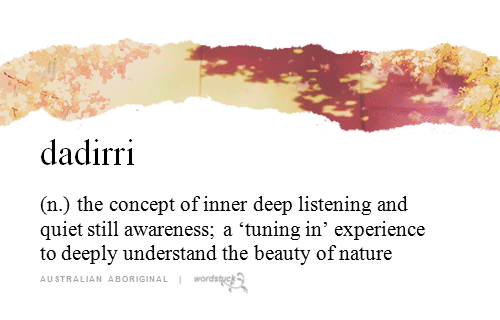Hello peeps! @ailindigo here :)
We're on the 25th week of Untranslatable Words and I think (I already lost count lol) for the first time we're going to Australia! A country whose aboriginal people have a special respect for nature, and through this week's word we'll see how this people teaches us their powerful concept of going inward.
This week's word is the Autralian aboriginal: dadirri.

Gif by Wordstuck
dadirri
Finding this word was a total serendipity, it encompasses a beautiful concept and practice that isn't very alien to many of us, and that made me specially reflect on how looking to heal by ourselves is a natural action, something we do as part of our human nature.
dadirri means ‘listening to one another’, but listening in contemplative/reciprocal relationships. Deep listening and learning more than just ‘listening by the ear’, but ‘listening from the heart’. *
Dadirri is a word from the Ngan’gikurunggur and Ngen’giwumirri languages of the aboriginal people of the Daly River region, 220 kilometres south of Darwin, Northern Territory, Australia. Aboriginal writer and senior elder Miriam-Rose Ungunmerr-Baumann, who has provided great insight on what the concept of dadirri means not only for researchers but everybody, says dadirri is the greatest gift we can give to our fellow Australians, the gift that Australians are thirsting for. *
There are many Australians who appreciate that Aboriginal people have a strong sense of community, especially because this concept enhances how deep listening describes the processes of deep and respectful listening to build community. As it is known, the aboriginal people's main way of passing stories was orally as they knew no writing, and in order to reproduce these stores accurately they had to listen carefully. Now, the proof of the impact of this aboriginal people's practice on the rest of Australians is the existance of a beautiful expression from Central Australia: "Can they bend the knees?" it inquires if you can sit down and truly listen, a prerequisite for effectively absorbing information, but also an allusion to how information is passed on in that area: by sitting on the red earth. *
In the Miriam-Rose Ungunmerr's reflection on Dadirri, she mentions what the name of her tribe means, not only to stand out the inner deepness suggested by the concept but also, I think, to make us see a clear and accurate analogy of humans relationship with nature and why it is so important for her people: Ngangikurungkurr can be broken up into three parts: Ngangi means word or sound, Kuri means water, and kurr means deep. So the name of my people means 'the Deep Water Sounds' or 'Sounds of the Deep'. This reflection is about tapping into that deep spring that is within us. *

dirthippieproductions
I think dadirri besides being a beautiful concept, it's also a very interesting one that not only highlights the importance of listening instead of talking or asking questions but also encourages us to overcome the fear of silence, quietness or even solitude; another thing I really like about it is that, according to Ungunmerr-Baumann, it can be used as a tool to quieten the mind as it teaches about "the quiet stillness and the waiting", because I see it as a way to heal by ourselves and a way of learning and growing without the need of external guidance as the true answers are inside of ourselves.
Dr Laura Brearley says that "as a research methodology, the practice of deep listening is an invitation into culturally congruent ways of learning and knowing." Deep listening is at the basis of some therapeutic methods used in counselling, and after reading psycho-therapist Eleni Kyrpigikidis thoughts on dadirri; where she says the ideal relationship between therapist and client –one based on trust and safety– occurs because of the therapist's dadirri ability, it be able to sit, hold and deeply listen to the client’s own discomfort, shame, pain and suffering in a non-judgemental way; it was even more clear to me how it is possible for us to heal simply by ourselves, and that a therapist's goal is basically help us listening to ourselves so we can do the rest. What I liked the most of what she said was her emphasis on being able to stop and deeply listen to what we are really feeling and experiencing, and how after done for the first time this becomes fundamental to experience wellbeing.
I think this is indeed a beautiful concept that reminds us that everything we need is inside of us, that encourages to introspect and find the answers inside instead of outside; a practice that allows us to genuinely listen not for what's being said but for what's not being said and also to be in the present moment and aware of everything, without hurrying things up; it's a kind of contemplation –either of literally yourself or nature around you– that encourages us to dive into our own depths and learn to face it and enjoy the silence, something many people are threatened by and can't deal with. As Miriam-Rose says Dadirri recognises the deep spring that is inside us. We call on it and it calls to us.
What do you think? Can we find healing in dadirri as a practice? Are all the answers inside? Please feel free to let me know what you think in the comments!
Thank you very much for passing by! And if you have an Untranslatable Word you'd like to suggest, please don't hesitate to do so! :)
Previous Untranslatable Words:
#1: Torschlusspanik
#2: Mono no aware
#3: Rasāsvāda
#4: Cavoli riscaldati
#5: Nefelibata
#6: Sturmfrei
#7: Jootha
#8: bilita mpash
#9: resfeber
#10: Vāde mēcum
#11: sankofa
#12: annus mirabilis
#13: voorpret
#14: pikit mata
#15: ranorànilac
#16: gagung
#17: gumusservi
#18: yaourter
#19: nunchi
#20: flâneur - the aesthetic experience of wandering through the city
#21: xibipíío - how the Pirahã deconverted a Christian man
#22: aduantas - rambling between two nuances
#23: Eh - Canada's proud politeness
#24: Janteloven - the egalitarian nature of Nordic countries
This content is part of a new series to get more people interested on languages and how they, perception and culture are related!
Exclusively for the Hive Cross Culture Community, the community for language exchange and cross-cultural purposes.
If you'd like to be part of the discussion don't hesitate to hop into the Hive Language and Culture Exchange Discord server! As well as subscribing to the Hive Cross Culture Community so you don't miss any new word comming ;) We'll be sharing a new Untranslatable Word each week!

